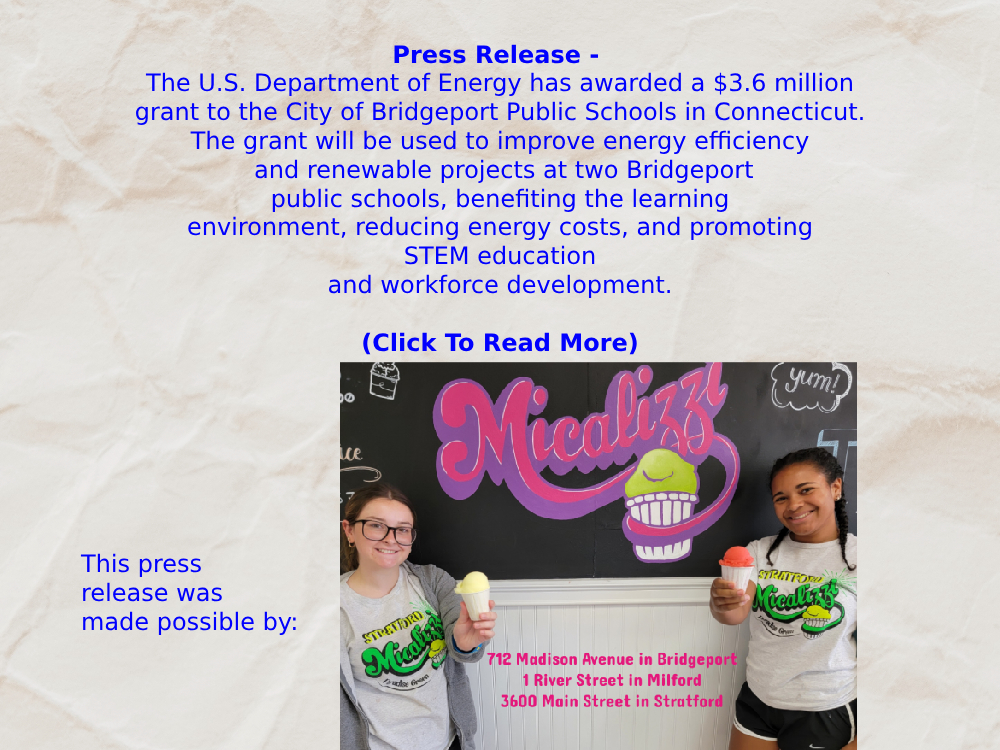Bridgeport, CT – The U.S. Department of Energy (DOE) announced that it has selected a proposal submitted by the University of Connecticut (UConn) and Bridgeport Connecticut Public Schools (BPS), to implement comprehensive energy efficiency and renewable projects at two Bridgeport public schools through the U.S. DOE’s Office of State and Community Energy Programs. The total award for two projects and support for the energy efficiency workforce development and training is $3.6 million, of which over $3 million is expected to be invested in technology and upgrades for the schools. The DOE funding will support an effort to design and implement equipment retrofits and upgrades for two Bridgeport K-12 schools, Geraldine Johnson Elementary and Luis Munoz Marin Elementary. The schools will serve as demonstration sites for all 39 schools in the City of Bridgeport, and for thousands statewide and nationally. The projects focus on the use of renewables and smart control systems to achieve deep energy savings and create healthy learning environments. The grant will also support workforce development initiatives in the state. The ENERGIZE CT programs administered by United Illuminating, an Avangrid Company, is a partner in the grant and will provide incentives and rebates to support the project. The two schools will receive deep energy retrofits by installing Siemens controls and building management systems, new condensing boilers, heat pump water heaters, VFD’s, and energy efficient lighting with controls. The schools will also receive retro commissioning of heating and cooling systems to improve energy efficiency and indoor air quality. BPS will install solar and battery systems where possible to lower GHG emissions and electricity costs, and to provide resiliency to these schools that serve disadvantaged communities as emergency shelters. Public engagement with this funding opportunity has been unprecedented, as this project was one of only 24 projects selected nationwide. K-12 schools submitted over 1,000 Concept Papers from 48 states and 2 Territories, totaling nearly $5.5 billion in requests. After receiving feedback on their proposals, Local Education Agencies (LEAs) from 44 states submitted 236 eligible Full Applications, totaling $1.62 billion in requests. Due to high demand and overwhelming evidence of public need, DOE more than doubled the first tranche of funding from $80 million to $178 million to support the program. “I would like to thank the U.S. Department of Energy for awarding Bridgeport’s Public Schools with an Energy Efficiency Grant,” stated Mayor Ganim. “It’s an honor to receive funding to help provide our students with infrastructure improvements that can not only benefit our sustainability initiatives but will also be a great addition to the learning environments to our students. Bridgeport students deserve access to healthy learning spaces while influencing the importance of energy efficiency. With this grant, we hope this will serve as a model for adaptation in the City of Bridgeport to continue our journey towards being an environmentally friendly city.” The project will also support workforce development by funding students in apprenticeship programs with scholarships at the Connecticut Technical Education and Career System and provide internships for engineering students at Housatonic Community College (HCC) and the UConn who will work with Loureiro Engineering to support engineering design, construction management, and measurement and verification activities. K-12 learning modules will be developed and delivered to students in the Bridgeport Public School System by UConn’s Vergnano Institute for Inclusion on energy efficient technologies for schools and their impacts on student health and learning. UConn will partner with local government agencies and Sustainable CT to disseminate project lessons learned and results to other school systems in Connecticut. This competitive grant is a part of the $500 million Renew America’s Schools program, which aims to help K-12 public schools across the country make energy improvements that (1) improves air quality and occupant comfort, creating healthier and safer classrooms that support student learning, (2) reduces energy use and energy costs, generating sustainable savings that can be redirected towards educational initiatives, (3) lowers emissions, reducing community exposure to pollutants putting America on a path to a net-zero energy economy by 2050, and (4) promotes Science, Technology, Engineering, and Math (STEM) education, Career and Technical Education (CTE), and workforce development, creating a pipeline of employees prepared for a clean energy future.

